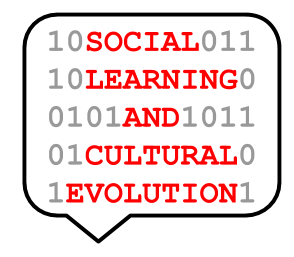The fields of social learning and cultural evolution aim at understanding how the exchange of knowledge within a group of individuals influences their performance. While cultural evolution focuses on how collective knowledge evolves over time within a population, social learning is concerned with the exchange of knowledge among individuals. Cultural evolution builds upon the mechanisms offered by social learning. This relationship is visible within the Alife community as social learning and cultural evolution are studied using similar methodologies, such as evolutionary robotics, evolutionary game theory, and evolutionary algorithms. This edition of the workshop will mainly, but not exclusively, focus on grand challenges of social learning and cultural evolution research in artificial life.
The core of the workshop will consist of short presentations from contributors on their work in the field (current or historical), collective research goals and milestones in social learning and cultural evolution or new concepts, modelling techniques or research questions. Presenters are encouraged to address any of the following topics (though this list is not exhaustive):
- Social Learning Mechanisms
- Social Information Transfer
- Transfer learning
- The interaction between social and non social learning
- The interaction between learning and evolution
- Environmental Variability, Environmental Complexity, and Social Learning
- Social Learning Strategies
- Social Learning and Life History Evolution
- Models of Learning in Nature
- The Evolution of Culture
- Communication
- Social Networks and Social Contagion on networks
- Group structure and learning bias
- Social Robotics
- Grounded (Animat) models of Social Learning
- Do our definitions match those used in other related fields (i.e Imitation, Culture, ...)
- Human Cultural Evolution (Cumulative Culture)
- Co-operation
- Social Institutions
- Gene-Culture Co-Evolution/ Dual Inheritance Theory
- Philosophy of Culture
- Memetics
We ask potential contributors to submit an extended abstract (500 words). We are open to presenters who are contributing during the main conference to also talk about their work during the workshop in order to have additional discussions. PhD students and young career academics who are new to the field are encouraged to submit to this workshop.
Submissions will be accepted at EasyChair until June 14th and authors will be notified by June 28th. Easy Chair
Please see the SLACE website for more information: SLACE 2019
